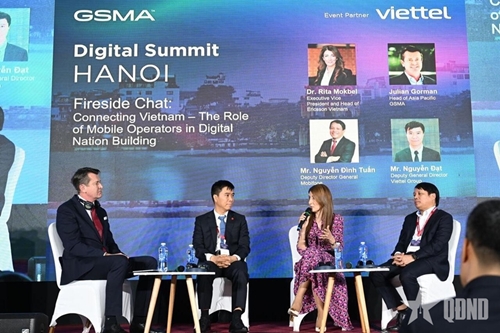Co-organized by the Global System for Mobile Communications Association (GSMA) and the Vietnam Digital Communications Association (VDCA), the summit aimed to respond and accelerate the process of comprehensive digital transformation, build a digital economy in Vietnam, connect top global technology corporations, and drive the development of digital infrastructure towards the realization of Resolution 57. At the event in Vietnam, Military Industry-Telecoms Group (Viettel) collaborated with GSMA in curating the agenda and discussion points for the various sessions.
    |
 |
|
Viettel’s Deputy General Director Nguyen Dat (second from the left) at the discussion |
The summit was part of a series of digital transformation activities across countries in the region, with the participation of such major technology companies as Qualcomm, Nokia, Ericsson, and LG. It focused on discussing solutions to building a modern and sustainable digital ecosystem in Vietnam.
Talking about the digital infrastructure development, Viettel’s Deputy General Director Nguyen Dat said that despite the considerable investment challenges associated with 5G, Viettel has set the goal of achieving coverage equivalent to current 4G network by 2026. “Our strategy involves deploying the most advanced 5G Massive MIMO antenna technology across both urban and rural areas, ensuring high performance and laying a robust foundation for next-generation digital services. This ambitious target shows our commitment to ensuring equitable access to technology for all citizens, irrespective of geographical location, thereby bridging the digital divide in Vietnam and propelling us towards our national goal of the digital economy contributing 30 percent to Vietnam’s GDP by 2030.”
A representative from Viettel High Tech, which is responsible for research and production of high-tech devices at Viettel, mentioned that Viettel has fully mastered 5G core network technology, confirming its role as both a telecom operator and a technology researcher and developer.
Beyond the deployment of its autonomous 5G core network, Viettel also unveiled encouraging progress in its research and development of Open RAN technology during a key discussion session. This strategic step aims to bolster Vietnam’s self-reliance in telecommunications infrastructure, reducing dependence on foreign vendors, fostering greater flexibility and openness within network architecture. By achieving proficiency in hardware and software domains, Viettel positions itself among a select group of global mobile operators capable of deploying a fully independent 5G ecosystem.
Building on this solid foundation, Viettel is moving towards 5G Advanced and 6G in the next five years, continuing to assert its pioneering position in telecommunications and information technology in Vietnam and the region.
The same day, representatives from Viettel Cyber Security and Viettel IDC had crucial discussions with GSMA, LG, Nokia, and Ericsson, focusing on technology solutions and policy recommendations within the vital domains of cybersecurity and artificial intelligence.
Speaking at the event, Julian Gorman, Head of Asia Pacific at GSMA, laid stress on the dynamic economic growth of Vietnam. He said that Vietnam is one of the region’s fastest-expanding economies, with Viettel as a dominant player. He considered the summit a crucial initial step in raising Vietnam and Viettel’s position in industry.
GSMA is a global organization representing over 750 mobile operators and 400 technology companies across the mobile ecosystem. Representing mobile operators and organizations in the mobile ecosystem and related industries, GSMA brings benefits to its members through three main pillars: connectivity for good, industry services and solutions, and outreach. GSMA achieves these goals by organizing the world’s largest annual tech events such as MWC and M360, advocating for policies, and supporting technology.
Translated by Tran Hoai